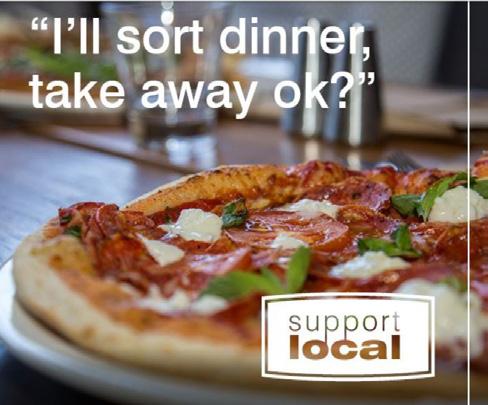
6 minute read
Streets ahead
WINING AND DINING SAFELY OUTDOORS
After months of offering only takeaway and delivery services, Victoria’s hospitality sector – and Local Government areas – geared up for re-opening with footpaths and car parking spaces being transformed for summer and extended outdoor dining.
Advertisement
Increased outdoor dining and installation of “parklets” meant the state’s cafes and restaurants could be COVID safe while adding to their seating capacity. As restrictions looked set to ease in September and October, Councils stepped up their capacity to approve applications, with most establishing dedicated teams to fast track the process and waiving application fees.
Introducing parklets – popularised in San Francisco – meant Councils began setting up protective bollards, planters and barriers at fashionable dining areas.
City of Melbourne CEO Justin Hanney said there were hundreds of outdoor dining applications in a few weeks, or the equivalent of four years' worth of applications in normal times. “Our expanded team has assessed all applications received and will continue to take a proactive approach to every opportunity to turn Melbourne back on."
"This is all about working with businesses to find creative ways to enjoy our famous food and wine culture both indoors and outside. We can't wait to welcome people back to our cafes, restaurants and bars again as much-loved parts of Melbourne,” Mr Hanney said.
The State Government established a $53 million Outdoor Eating and Entertainment Package to support outdoor dining, with more than $1 million supporting initiatives through the City of Melbourne and Government's Melbourne City Recovery Fund. At another popular eating area, all 1200 local dining venues applied for outdoor extensions or Parklets at the City of Yarra. The Council introduced special concrete bollards with coloured material covers to help keep customers safe while dining outside.

Preparing to extend into parking spots in Rippon Lea.
In Wyndham, Mayor Josh Gilligan said the parklets were designed to offer outdoor options for diners as well as provide increased space and opportunity for customers in the transition back to normal business. “The parklets occupy previous car spaces that are not being used as frequently due to many residents still working from home rather than returning to their workplace,” he said.
“This will not only give food outlets a financial lift, but it will increase the morale of the entire street to see people enjoying our city centres again.”
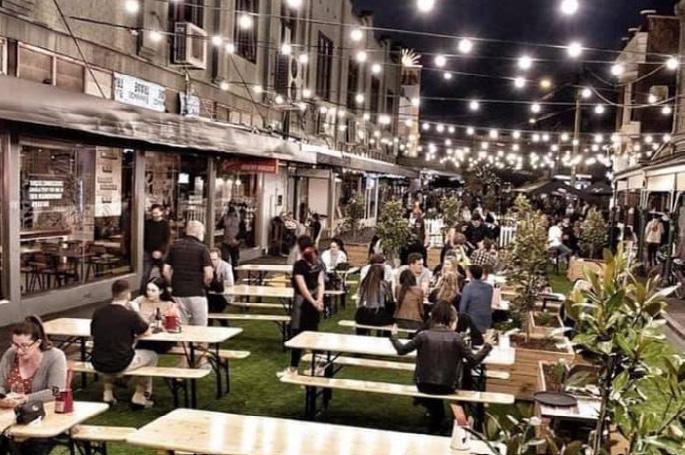
Temporary street dining in Hobson Bay.
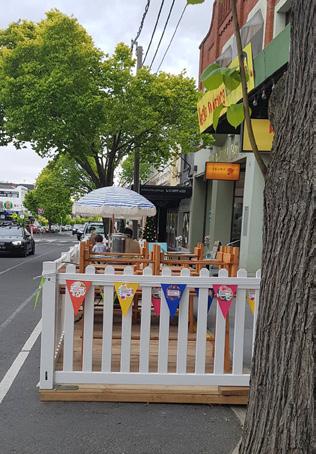
Parklets in Brighton, in Melbourne's Bayside City Council.
TAKING DINING TO THE STREETS
Port Phillip Council worked closely with businesses and trader groups to ensure as many temporary outdoor dining sites as possible were ready to take orders when COVID-19 restrictions eased in late October.
Footpaths and parking bays across the municipality took on a festive flavour as traders transformed public spaces into enticing outdoor dining areas.
Railway Club Hotel owner Jonathan Woolley aimed to accommodate more diners at his popular Port Melbourne steak restaurant, after being closed for much of the year.
As COVID-19 safety rules reduced the number of tables he could put on the footpath or make available for inside, Mr Woolley placed several outdoor dining pods on four parking bays outside the hotel.
"I can seat 42 diners in the pods and eight on the footpath which means I can achieve the outdoor maximum of 50 for my premises. So this will make a big difference when we play catch-up after being closed for so long. It's a real game-changer – we're a viable business again."
Mr Woolley said he appreciated Port Phillip’s assistance, which included swiftly assessing his application and providing a permit at no cost. "They understood what I wanted to achieve and helped me to get ready to reopen. We can't wait to welcome everyone back."
City of Port Phillip CEO Peter Smith said the Council was keen for local traders, hard-hit by the pandemic, to have a safe and successful summer. "Facilitating outdoor dining under our Live Love Local campaign by granting extended footpath trading or turning parking bays into business parklets is just one of the ways we are helping traders make the most of the hugely important summer trading season," Mr Smith said.
By late October, there were 67 extended footpath trading applications – plus 39 outdoor dining extensions – with an average turnaround of five days. Business parklets attracted 85 applications.
The Council has so far provided $240,000 in footpath trading rebates to traders for the last quarter of 2019 and waived $300,000 in footpath trading fees for July to December 2020.
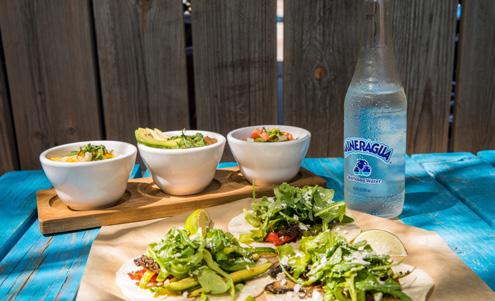
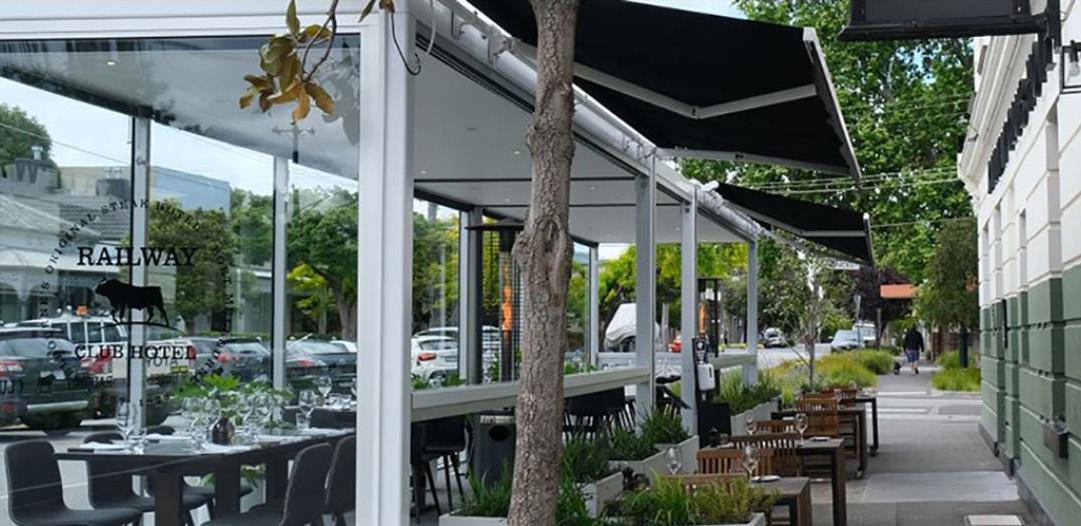
Under shelter at the Railway Club Hotel.
STATE STEPS UP APPROVALS
The Victorian Government helped pave the way for increased outdoor dining by streamlining planning approvals and fast-tracking liquor licence approvals.
Planning Minister Richard Wynne said in October that pubs, restaurants, cafes and other food and drink venues could use existing outdoor spaces, as well as nearby parks and public land to accommodate and serve patrons without needing a permit. The exemptions allowed venues to capitalise on nearby streets, footpaths and carparks to add to their capacity while restrictions reduced patron numbers inside.
Melbourne hospitality businesses reopened on 1 November. The provisions also provided exemptions for construction of temporary buildings, parking provisions, along with the sale and consumption of liquor – subject to conditions.
The changes build on the $187.5 million package announced in September to support the industry to reopen safely, including grants to help set up outdoor dining areas.
“We understand this has been an incredibly challenging time for our hospitality venues and these exemptions will help to make sure the transition to COVID-safe dining is as easy as possible,” Mr Wynne said.
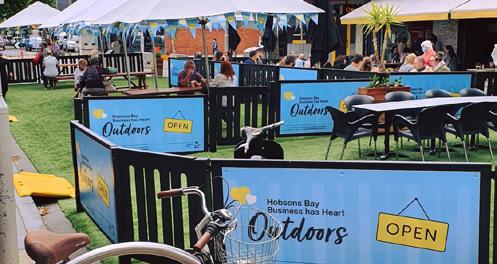
A festival atmosphere in Hobsons Bay.
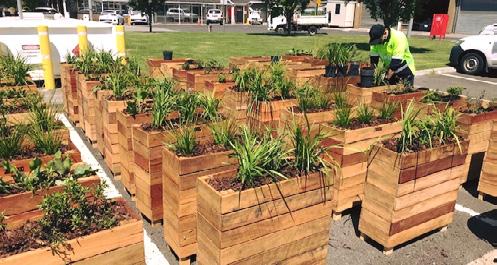
Garden planters are prepared before installation.
Bottom images supplied by Hobsons Bay Council.
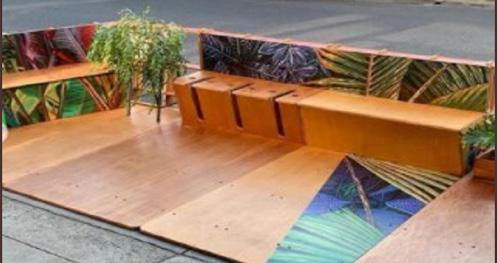
Another interpretation of the parklet in Brunswick.
SUPPORTING PENINSULA PURSUITS
Mornington Peninsula Shire welcomed the easing of COVID restrictions with a campaign to support local restaurants, cafes, producers and other businesses.
Mornington Peninsula Shire welcomed the easing of COVID restrictions with a campaign to support local businesses. Shire CEO John Baker said the easing of restrictions meant that: “Now it’s time for us as a community to focus on how we can support our local businesses by engaging local service providers and shopping locally, wherever possible.
“The Shire’s focus is firmly on getting our local businesses trading again. This is our number one priority. We want to make it as easy as possible for local businesses to trade in a way that will maximise turnover while remaining COVID-safe.
“We have already instigated a light touch, streamlined permit system for extended outdoor trading, including extended footpath space and new parklets, which repurpose car parking spaces outside shop fronts.
“We are also currently working closely with the business community to identify key shopping strips that could be opened up to pedestrians and diners. “We want to provide more options to enable people to support our local economy and enjoy all the Peninsula has to offer.”
